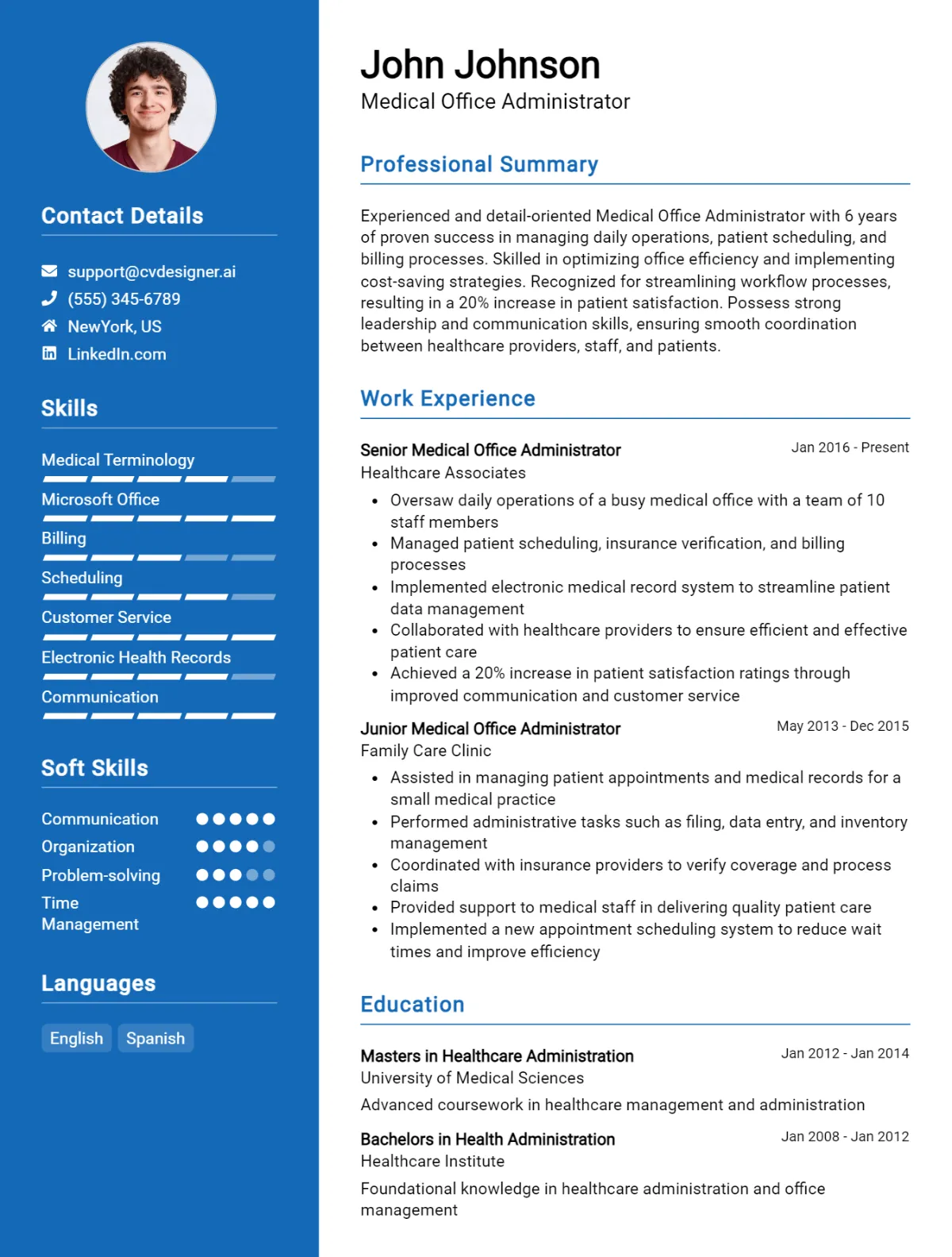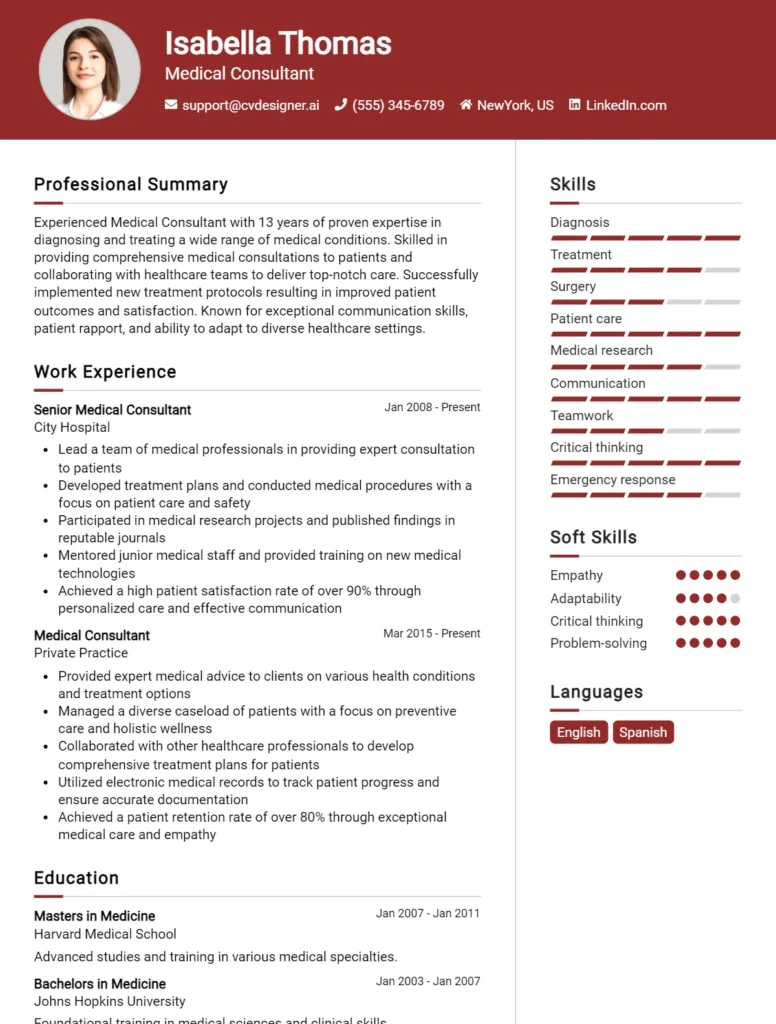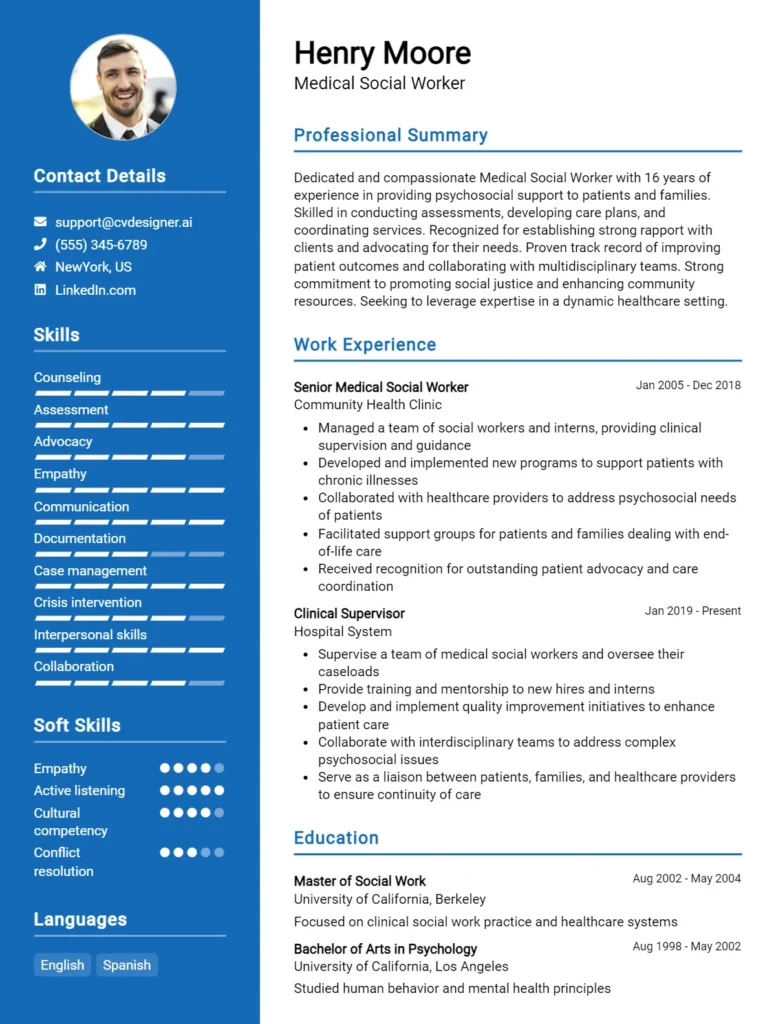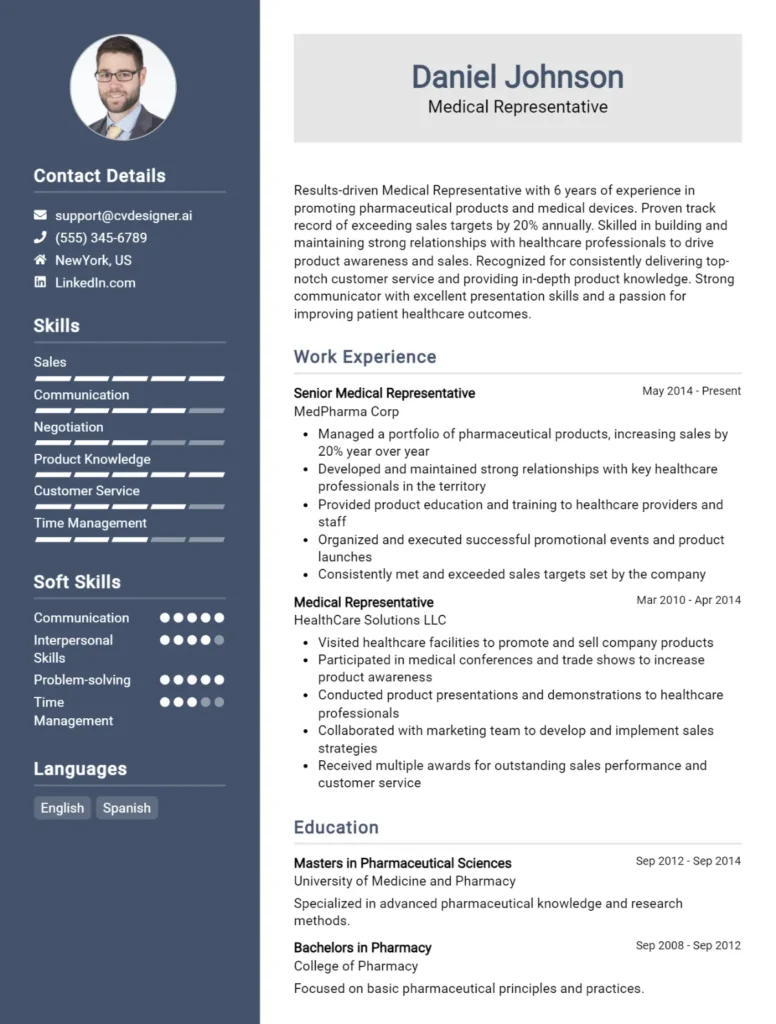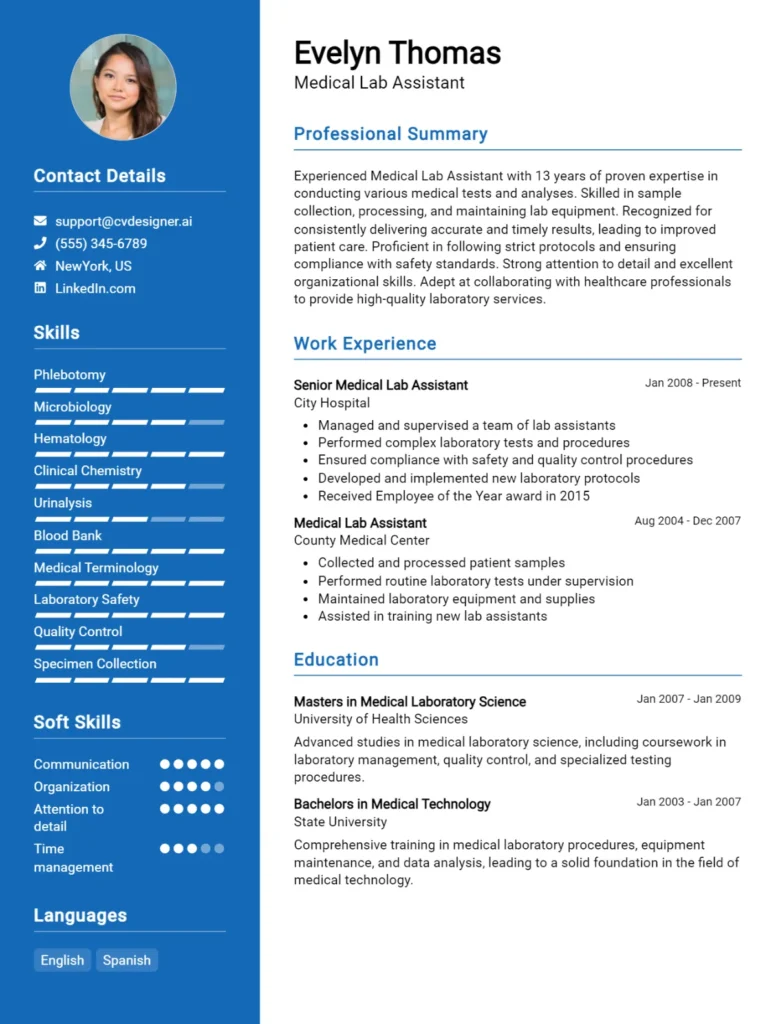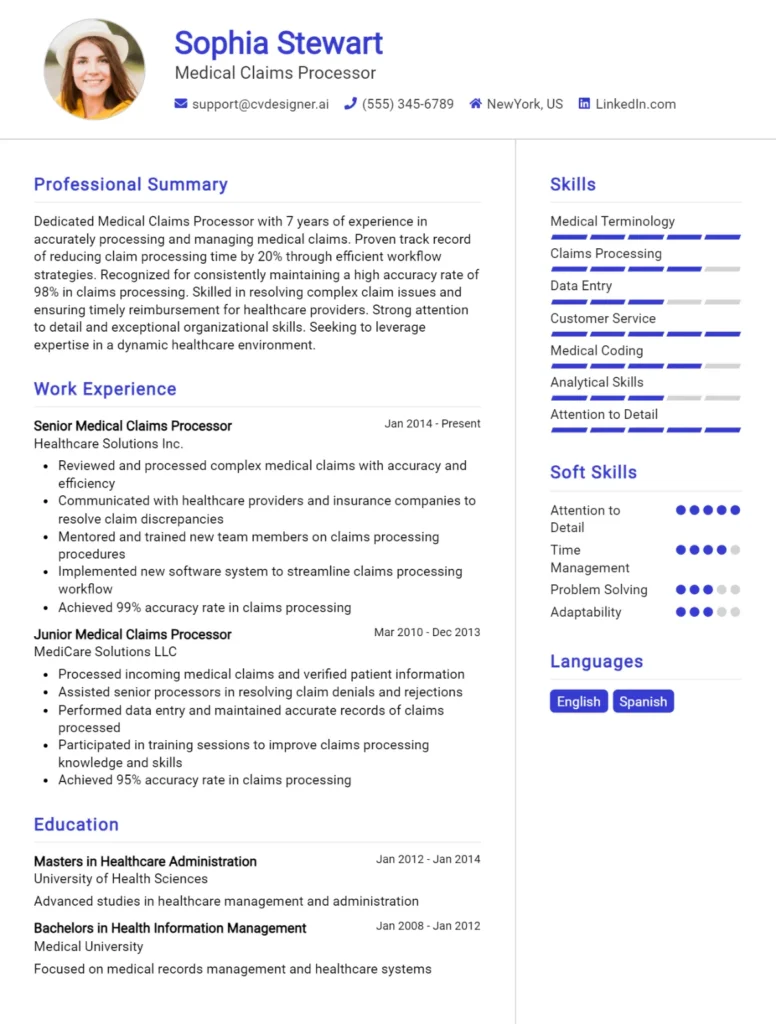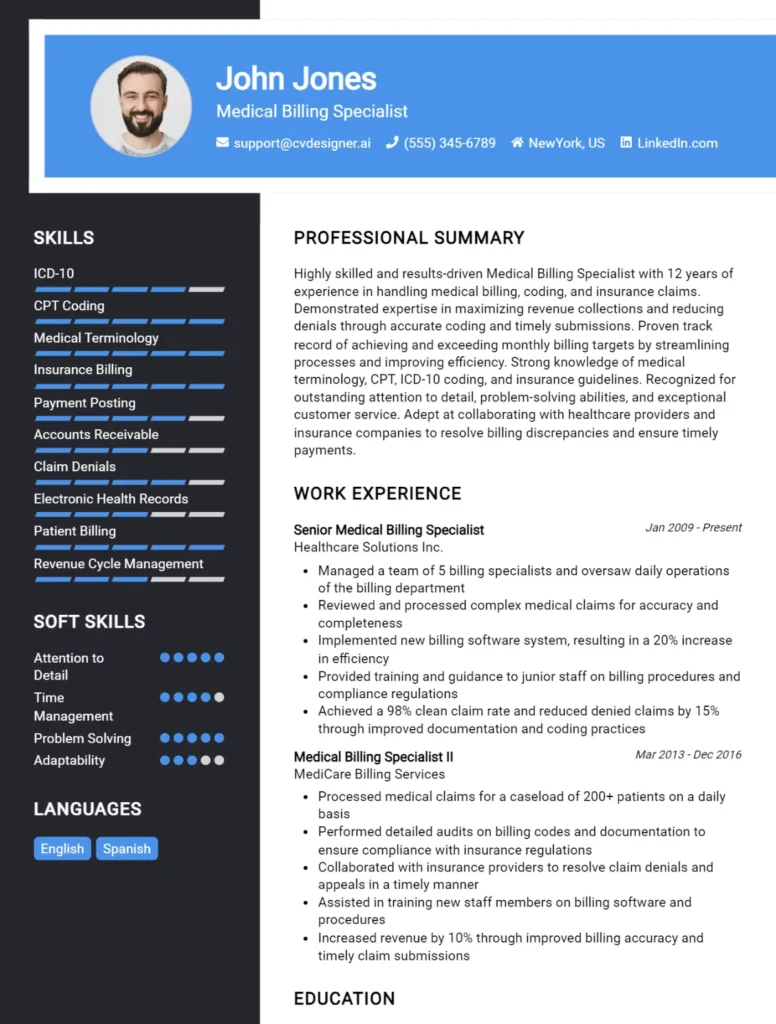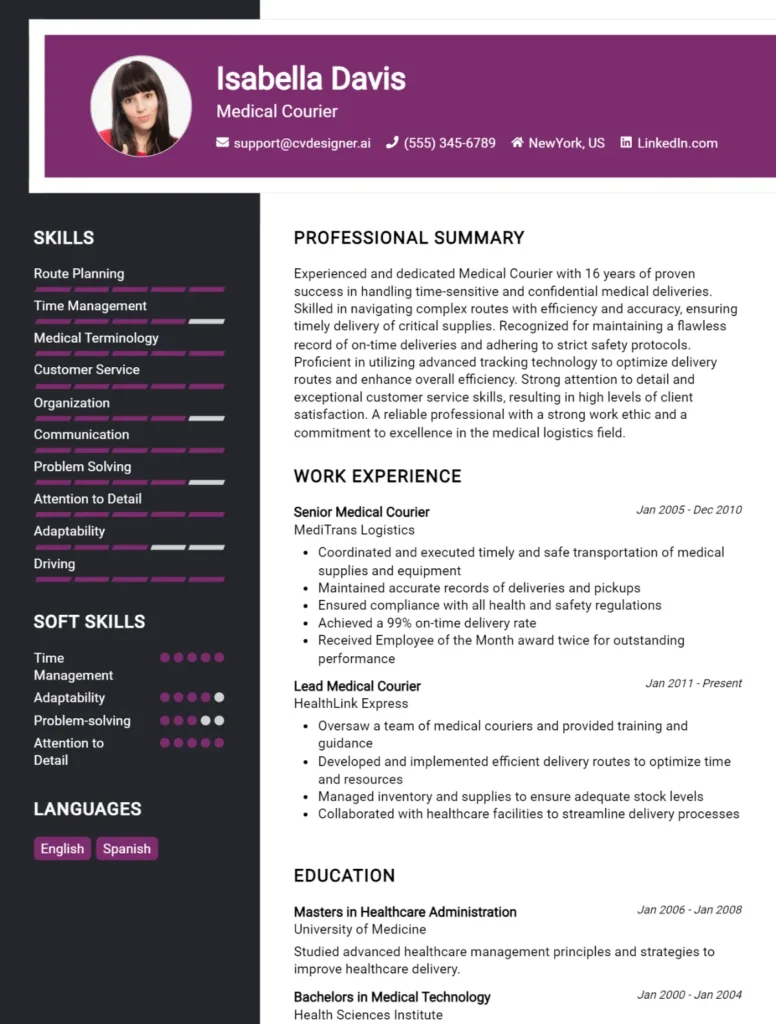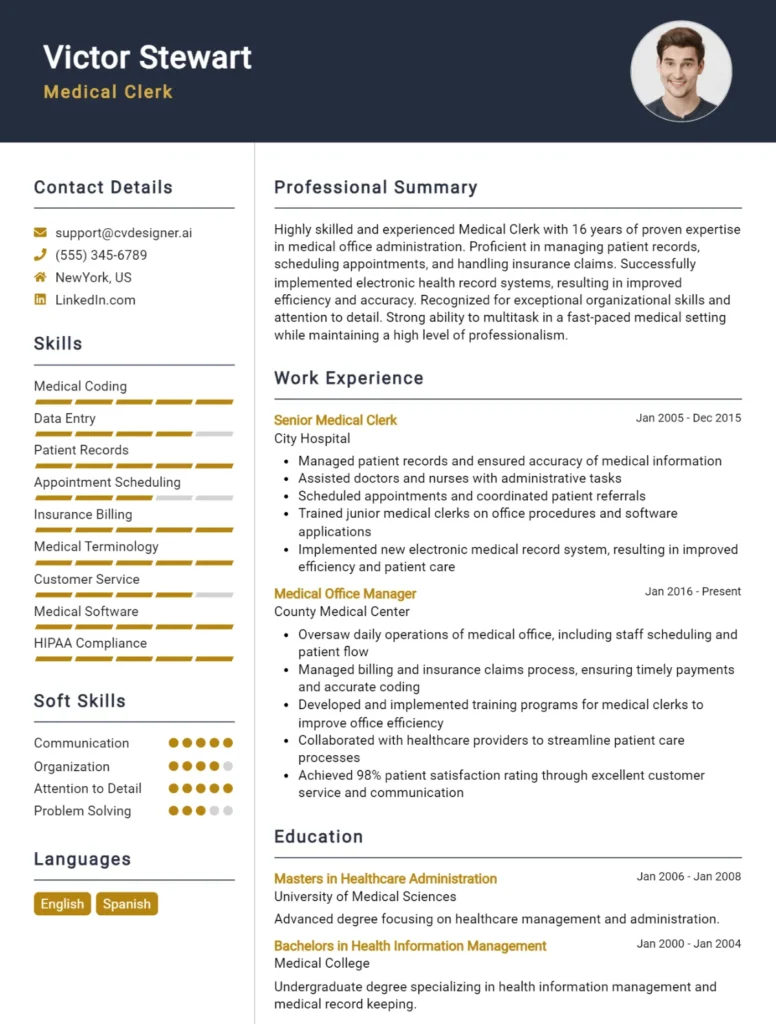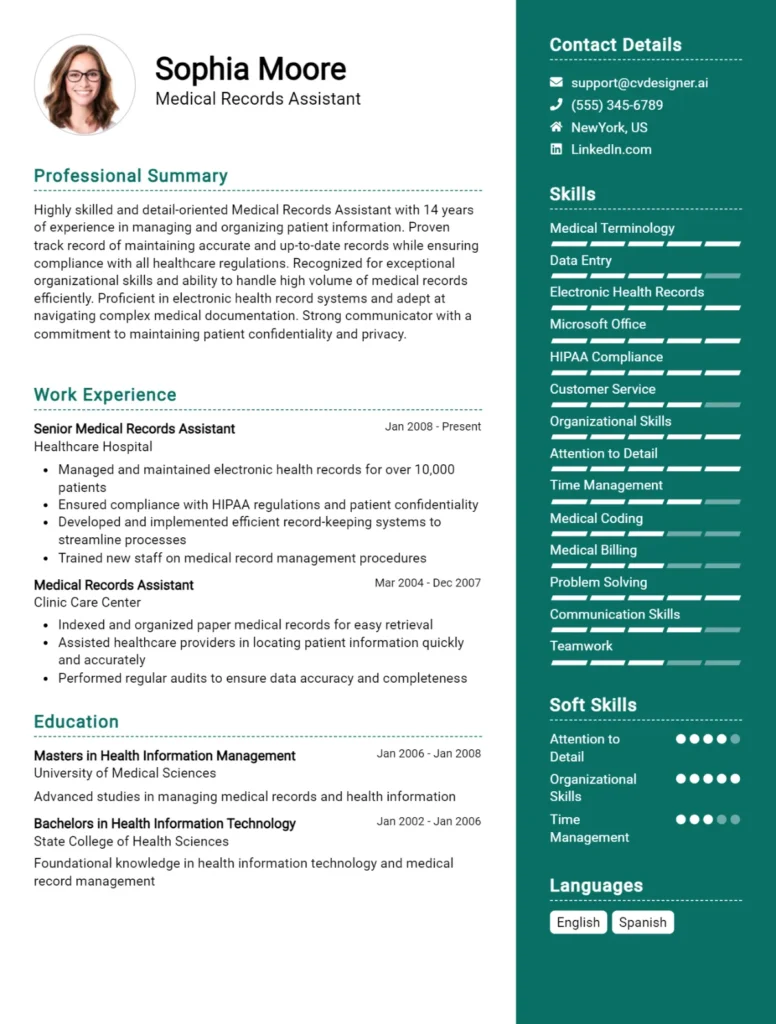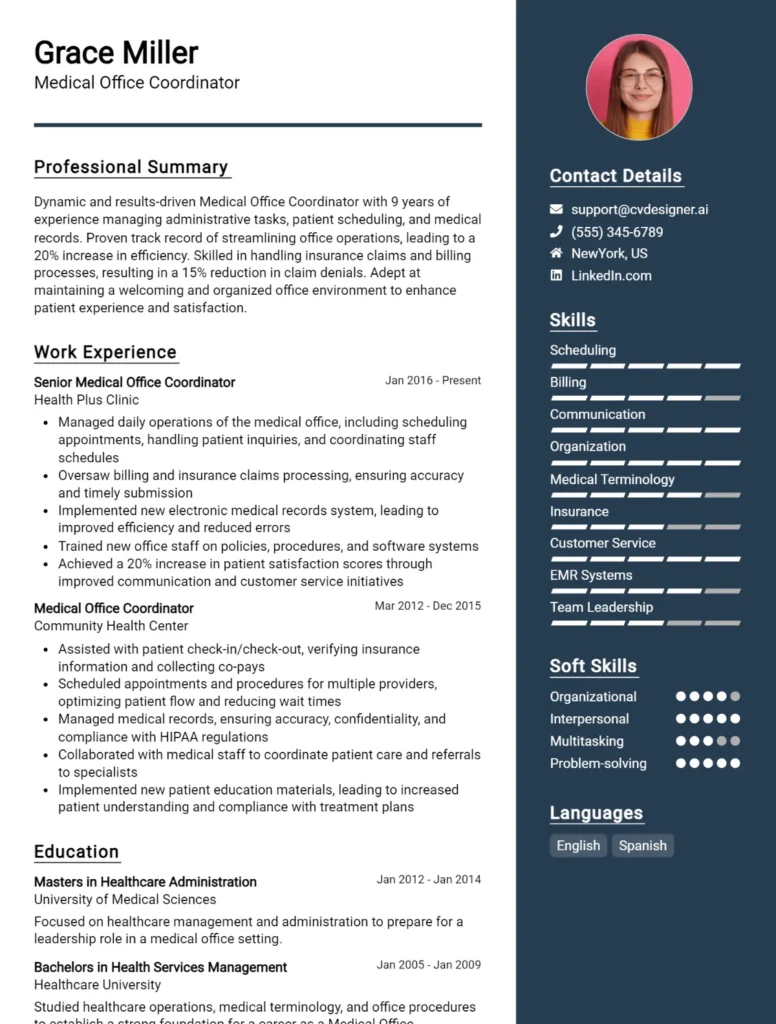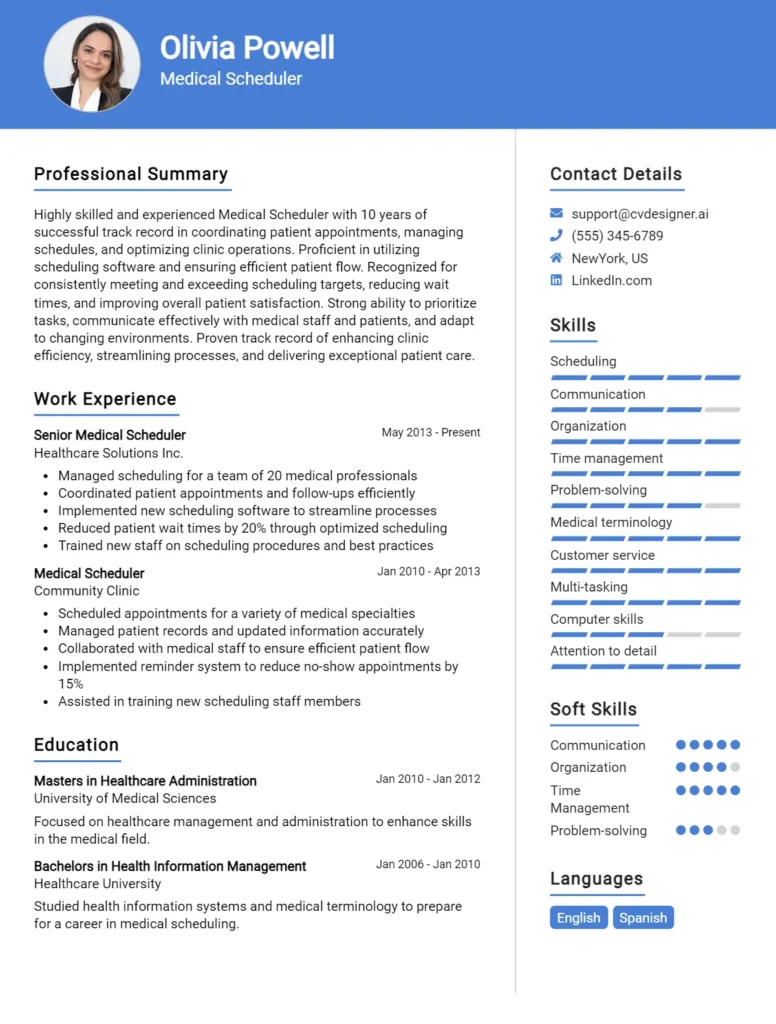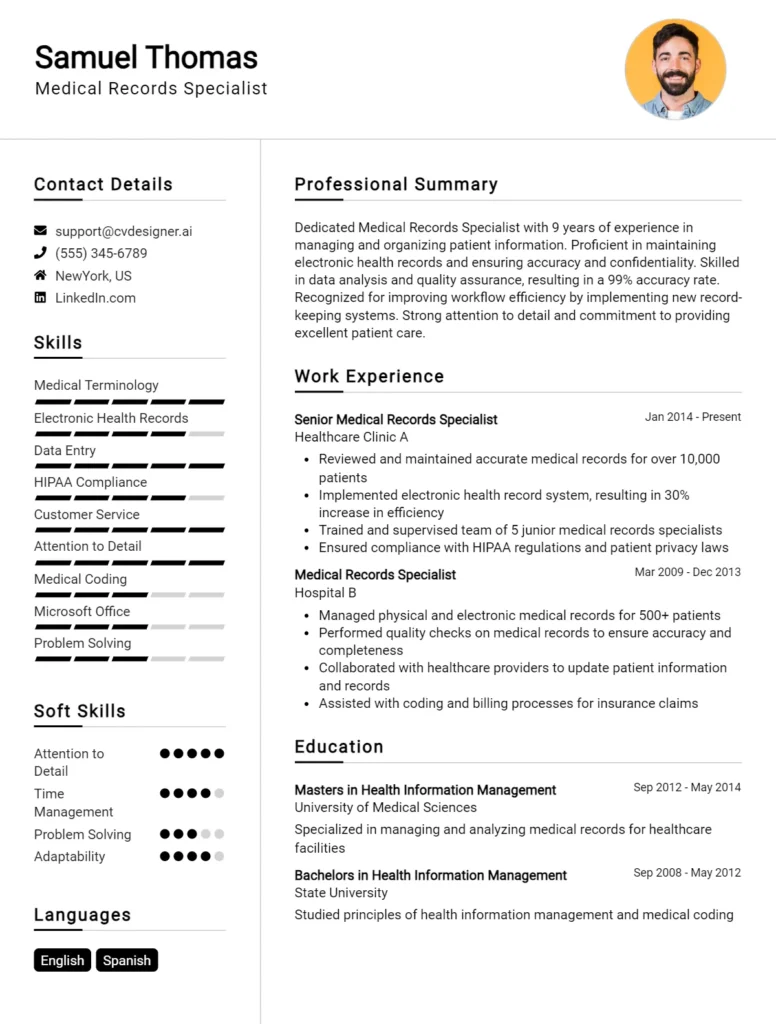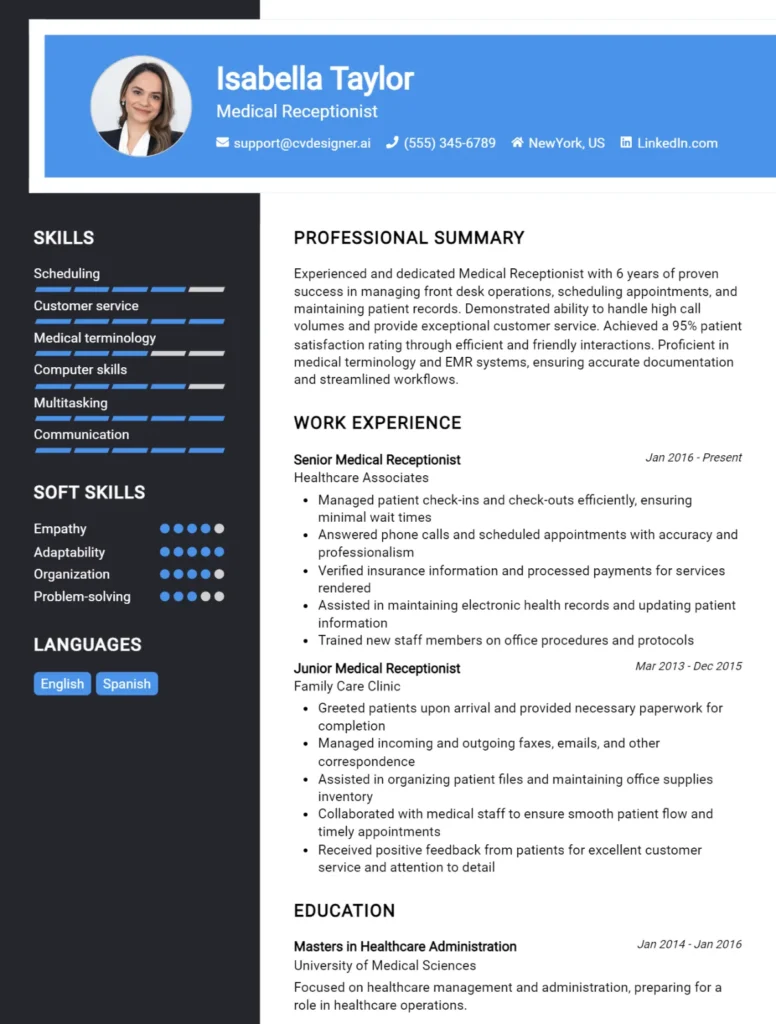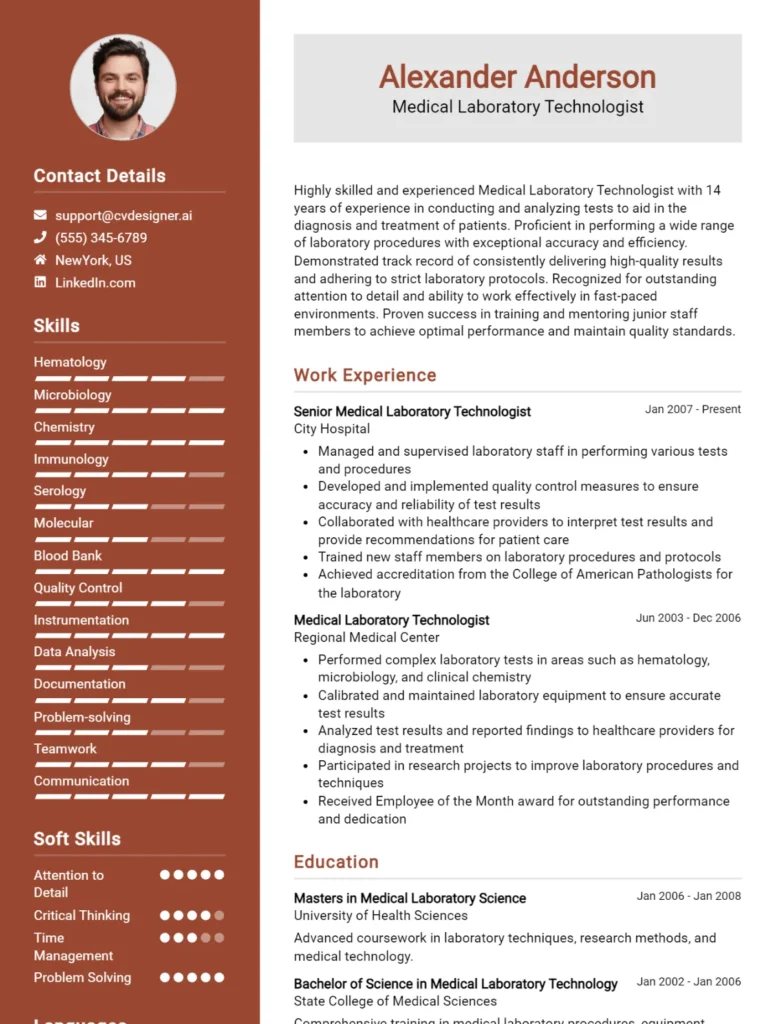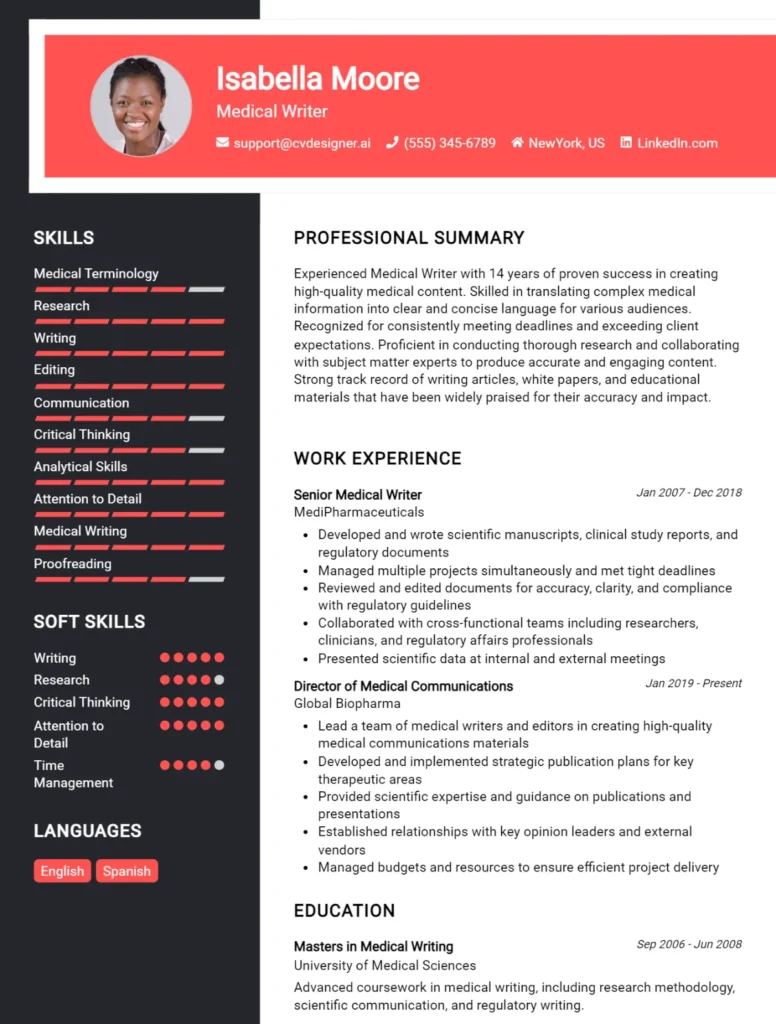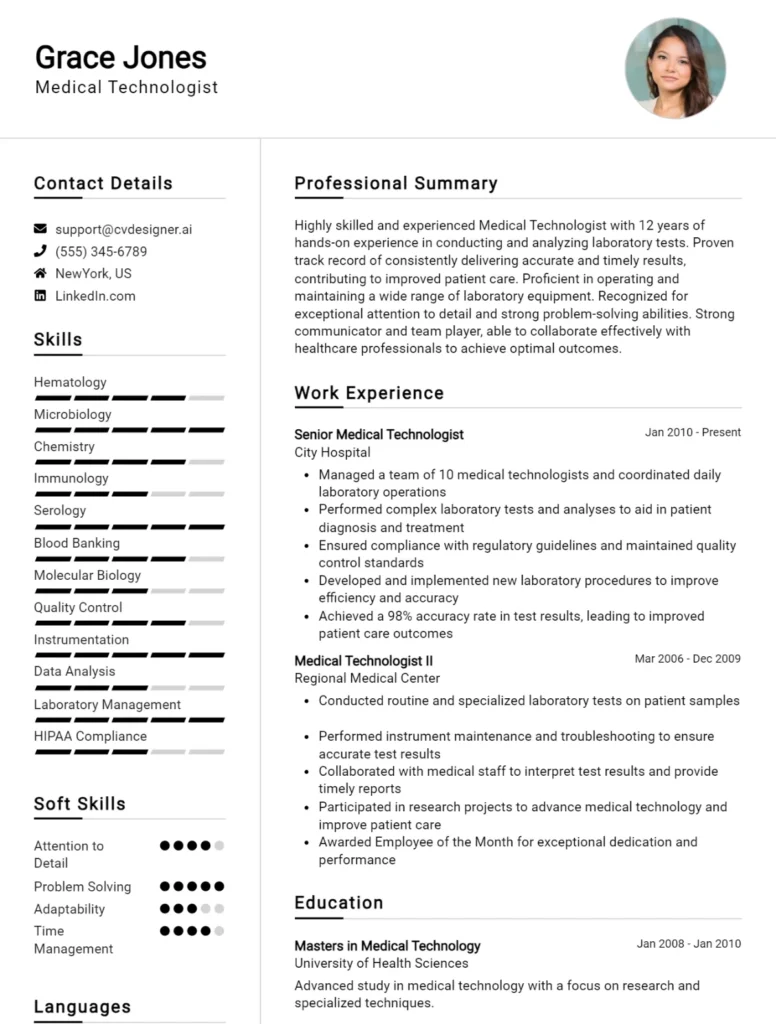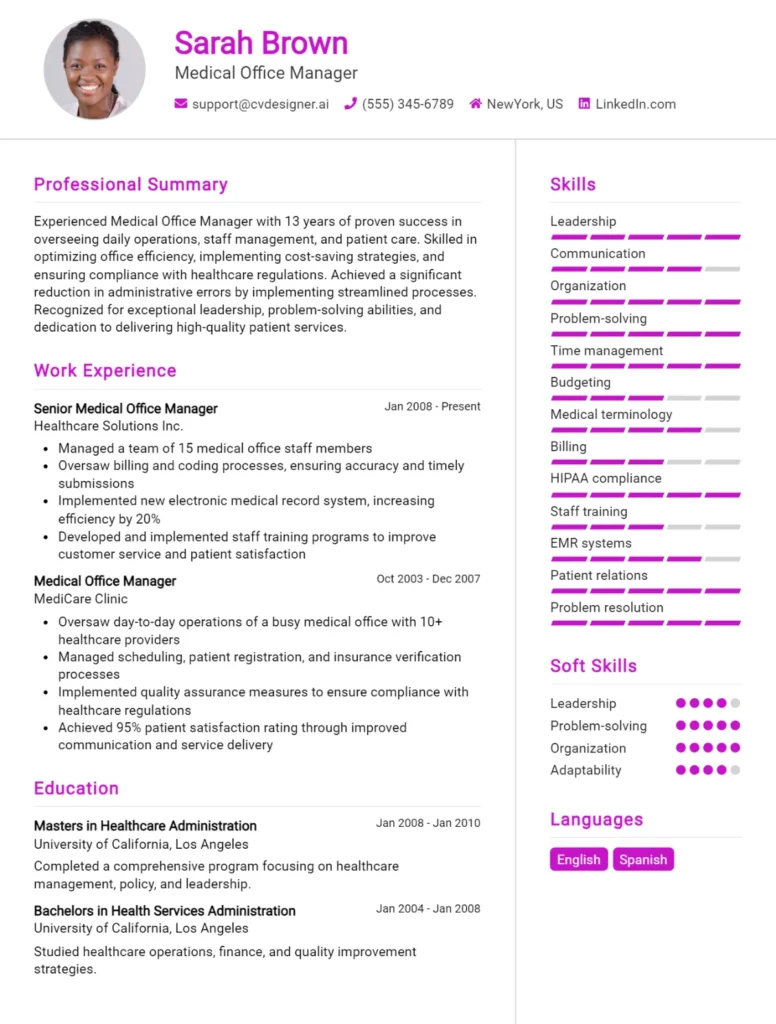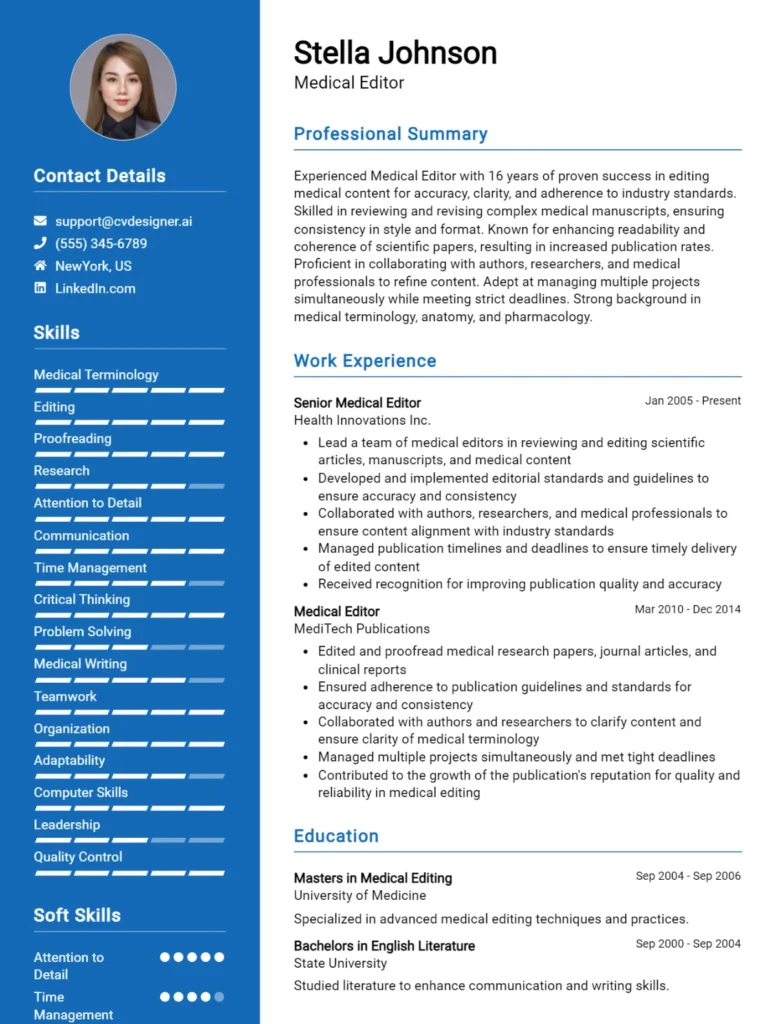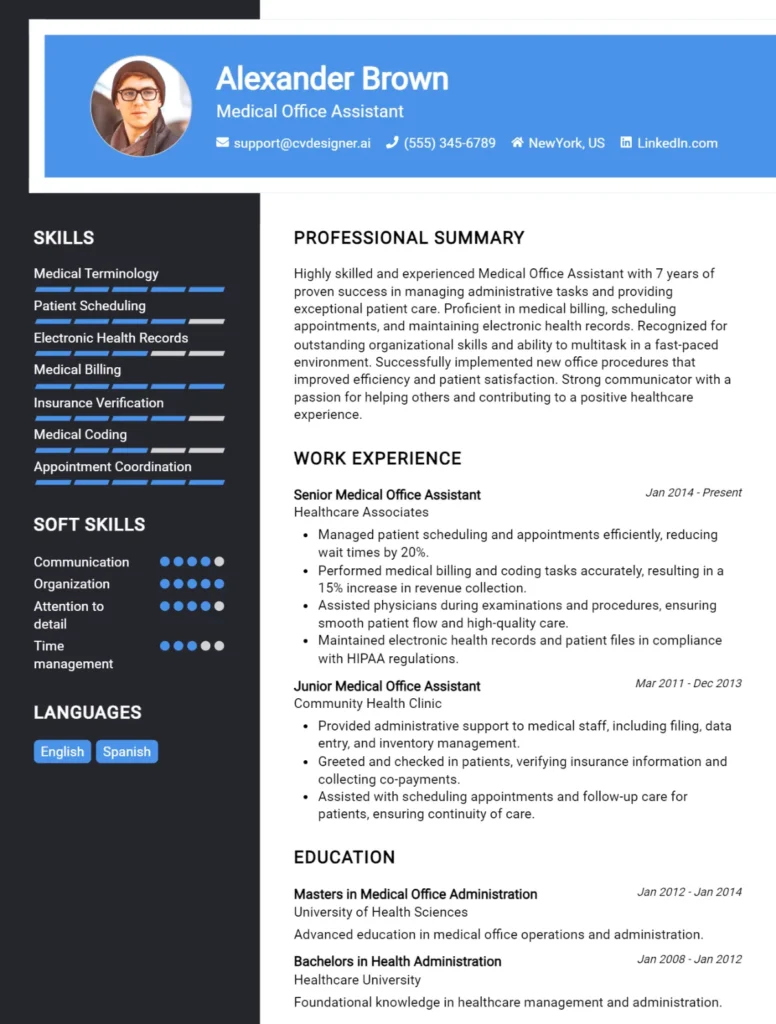Most Popular Medical CV Examples
Explore additional Medical CV samples and guides and see what works for your level of experience or role.
As a vital link between healthcare providers and patients, the role of a Medical Office Administrator is both rewarding and demanding. Crafting a compelling CV is essential to stand out in this competitive field. In this comprehensive guide, you'll discover everything you need to know to create an impressive CV that highlights your skills and experiences effectively. We will cover essential tips for structuring your CV, the importance of tailoring it to specific job postings, and how to showcase your administrative expertise in a medical setting. By the end of this article, you'll be equipped with a clear understanding of what makes a successful Medical Office Administrator CV, along with a practical example to guide your writing. Here’s what you can expect to learn:
- Essential components of a Medical Office Administrator CV
- Tips for showcasing relevant skills and experiences
- How to tailor your CV for specific job applications
- Strategies for formatting and organizing your CV for maximum impact
- Common pitfalls to avoid during the CV writing process
Dive in to transform your CV into a powerful tool that opens doors to your next career opportunity!
What is a Medical Office Administrator CV?
A Medical Office Administrator CV is a vital document that showcases an individual's qualifications, skills, and experiences relevant to managing the operational aspects of a medical facility. This role often encompasses a variety of responsibilities, including scheduling appointments, managing patient records, and ensuring compliance with healthcare regulations. A well-structured CV not only highlights these capabilities but also demonstrates an applicant's understanding of the healthcare environment, which is crucial for standing out in a competitive job market. For those looking to craft an effective CV, a comprehensive cv writing guide can provide valuable insights and tips.
The importance of a CV for a Medical Office Administrator cannot be overstated. It serves as the first point of contact between the job seeker and potential employers, making it essential to present a polished and professional image. A strong CV should reflect relevant experience in medical administration, excellent organizational skills, and the ability to work collaboratively in a team-oriented setting. Utilizing a cv maker can streamline the process, allowing applicants to create a visually appealing and organized document that effectively communicates their qualifications and readiness for the role.
Key Components of a Medical Office Administrator CV
- Contact Information: Include your full name, phone number, email address, and LinkedIn profile (if applicable) at the top of your CV.
- Professional Summary: A brief overview of your qualifications, experience, and career objectives tailored to the role of a Medical Office Administrator.
- Key Skills: Highlight relevant skills such as patient management, scheduling, medical billing, and knowledge of healthcare regulations. For a comprehensive list of skills, refer to this skills guide.
- Work Experience: Detail your previous roles related to medical office administration. Include job titles, employers, dates of employment, and key responsibilities. For tips on how to effectively present your work history, visit the work experience section.
- Education: List your educational background, including degrees, certifications, and relevant coursework.
- Certifications and Licenses: Mention any certifications related to medical administration, such as Certified Medical Administrative Assistant (CMAA) or Certified Healthcare Administrative Professional (cHAP).
- Technical Skills: Include proficiency in medical software (e.g., EMR systems), Microsoft Office Suite, and other relevant technologies.
- Professional Affiliations: List memberships in relevant organizations, such as the American Association of Medical Assistants (AAMA) or the Healthcare Administrative Management Association (HAMA).
- Volunteer Experience: Highlight any volunteer roles that demonstrate your commitment to the healthcare field or relevant skills.
- Languages: Mention any additional languages spoken, particularly if they are relevant to the patient demographic in your area.
- References: Indicate that references are available upon request or include them if requested by the employer.
Sample Medical Office Administrator CV for Inspiration
[Your Name]
[Your Address]
[City, State, Zip]
[Your Phone Number]
[Your Email Address]
[LinkedIn Profile]
Professional Summary
Dedicated and detail-oriented Medical Office Administrator with over 5 years of experience in managing administrative tasks in fast-paced healthcare environments. Proficient in patient scheduling, electronic health records (EHR) management, insurance verification, and billing processes. Strong communication and organizational skills with a commitment to providing high-quality patient care and enhancing office efficiency.
Work Experience
Medical Office Administrator
ABC Medical Clinic, Anytown, USA
January 2020 – Present
- Oversee daily office operations, ensuring smooth workflow and efficient patient care.
- Manage patient scheduling and appointment confirmations, reducing no-show rates by 15%.
- Handle insurance verifications and pre-authorizations, increasing claim approval rates by 20%.
- Maintain accurate electronic health records (EHR) and patient files, ensuring compliance with HIPAA regulations.
- Collaborate with healthcare providers to streamline patient intake processes, enhancing patient satisfaction scores.
- Train and supervise a team of 4 administrative staff, fostering a collaborative and productive work environment.
Medical Receptionist
XYZ Family Practice, Anytown, USA
June 2017 – December 2019
- Provided exceptional front desk support, greeting patients and managing phone inquiries with professionalism.
- Scheduled patient appointments and coordinated follow-up visits, improving scheduling efficiency by 30%.
- Processed patient insurance claims and handled billing inquiries, ensuring timely payment from insurance providers.
- Assisted in maintaining an organized and efficient office environment, including inventory management and supplies ordering.
- Implemented a new patient tracking system that improved appointment reminders and follow-up communications.
Education
Associate of Applied Science in Medical Office Administration
Anytown Community College, Anytown, USA
Graduated: May 2017
Skills
- Proficient in Electronic Health Records (EHR) software (e.g., Epic, Cerner)
- Medical billing and coding knowledge
- Strong organizational and multitasking abilities
- Excellent verbal and written communication skills
- Customer service-oriented with a compassionate approach
- Knowledge of HIPAA regulations and patient confidentiality
Certifications
- Certified Medical Administrative Assistant (CMAA) – National Healthcareer Association, 2018
- CPR and First Aid Certified – American Red Cross, 2021
Publications
- Smith, J. (2022). "Improving Patient Flow in Medical Offices: Strategies for Success." Journal of Healthcare Administration, 15(3), 45-50.
- Smith, J. (2021). "The Importance of EHR in Enhancing Patient Care." Health Informatics Journal, 10(2), 112-118.
References available upon request.
Medical Office Administrator CV Writing Tips
When crafting a CV for a Medical Office Administrator position, it's essential to highlight not only your administrative skills but also your understanding of medical terminology and practices. Tailor your CV to reflect your experience in managing patient records, scheduling appointments, and handling insurance claims. Use clear and concise language, and ensure your CV is well-organized, making it easy for hiring managers to quickly identify your qualifications. Remember, your CV is often the first impression you make, so make it professional, polished, and reflective of your ability to thrive in a fast-paced medical environment.
- Customize Your CV: Tailor your CV for each application, emphasizing relevant skills and experiences specific to the job description.
- Highlight Relevant Experience: Include specific examples of your past roles in medical administration and any direct interactions with patients or healthcare providers.
- Showcase Technical Skills: Mention any medical software or electronic health record (EHR) systems you are proficient in.
- Include Certifications: If you have certifications such as Certified Medical Administrative Assistant (CMAA) or similar, make sure to list them prominently.
- Emphasize Communication Skills: Highlight your ability to communicate effectively with patients, healthcare teams, and insurance companies, as this is crucial in a medical office setting.
- List Soft Skills: Mention soft skills such as organization, attention to detail, and multitasking, which are vital for managing various administrative tasks.
- Use Action Verbs: Start bullet points with strong action verbs like "managed," "coordinated," or "oversaw" to convey your accomplishments more dynamically.
- Keep It Concise: Aim for a CV length of one to two pages, ensuring that all information is relevant and presented in a clear format.
Medical Office Administrator CV Summary Examples
As a Medical Office Administrator, your CV summary should highlight your organizational skills, experience in healthcare settings, and ability to manage patient interactions effectively. Here are several examples that showcase these qualities:
“Detail-oriented Medical Office Administrator with over five years of experience in managing front office operations and providing exceptional customer service in a busy healthcare environment. Proficient in electronic health record (EHR) systems and dedicated to improving patient satisfaction through efficient scheduling and communication.”
“Experienced Medical Office Administrator skilled in coordinating patient care and managing administrative tasks. Demonstrates strong multitasking abilities and a commitment to maintaining confidentiality and compliance with healthcare regulations. Known for fostering a welcoming atmosphere for patients and streamlining office procedures.”
“Accomplished Medical Office Administrator with a proven track record of improving operational efficiency and enhancing patient experiences in a multi-specialty clinic. Strong background in insurance verification, appointment scheduling, and patient follow-up, with a focus on building long-term relationships with patients and healthcare providers.”
“Proactive Medical Office Administrator with expertise in medical billing, coding, and insurance claims processing. Adept at maintaining accurate patient records and implementing office policies that ensure compliance with healthcare regulations. Passionate about delivering high-quality administrative support in a fast-paced medical setting.”
“Dedicated Medical Office Administrator with a strong emphasis on patient care and office management. Skilled in handling billing inquiries, managing schedules, and coordinating with medical staff to ensure seamless operations. Recognized for exceptional communication skills and ability to work collaboratively in a team-oriented environment.”
Build a Strong Experience Section for Your Medical Office Administrator CV
As a Medical Office Administrator, your experience section should highlight your expertise in managing healthcare operations, facilitating patient care, and ensuring efficient office management. Here are several strong work experience descriptions that demonstrate your skills, achievements, and contributions in a medical setting:
- Coordinated daily operations of a busy medical office, managing patient scheduling, medical records, and insurance verification for over 1,000 patients, resulting in a 20% increase in appointment efficiency.
- Implemented a new electronic health record (EHR) system that streamlined patient documentation and improved data retrieval times by 30%, enhancing overall office productivity and patient satisfaction.
- Developed and maintained strong relationships with insurance companies and healthcare providers to ensure timely processing of claims and appeals, achieving a 95% approval rate on initial claims submissions.
- Trained and supervised a team of five administrative staff, fostering a collaborative work environment and improving office workflow, which led to a 15% reduction in patient wait times.
- Managed patient billing and collections, proficiently handling inquiries and disputes while ensuring compliance with healthcare regulations, resulting in a 40% increase in collections within the first year.
- Conducted regular audits of medical records and billing processes to maintain compliance with HIPAA regulations, reducing discrepancies by 25% and enhancing the overall accuracy of patient information.
- Collaborated with healthcare providers to optimize patient care pathways, reducing appointment cancellations by 10% through effective communication and follow-up procedures.
- Assisted in the development of office policies and procedures that improved operational efficiency and enhanced patient experience, leading to a 4.8 out of 5 patient satisfaction rating in annual surveys.
Medical Office Administrator CV Education Examples
A Medical Office Administrator plays a crucial role in ensuring the smooth operation of healthcare facilities by managing administrative tasks while providing support to medical staff and patients. A strong educational background is essential for success in this role, encompassing various disciplines that equip candidates with the necessary skills in healthcare management, office administration, and patient interaction. Below are examples of educational qualifications that are relevant to aspiring Medical Office Administrators:
- Associate Degree in Health Administration
This degree provides foundational knowledge in healthcare systems, medical terminology, and the management of health services, preparing graduates for roles in medical office settings. - Bachelor’s Degree in Business Administration with a focus on Healthcare Management
A bachelor's degree in business administration, particularly with a concentration in healthcare, emphasizes management principles alongside an understanding of the healthcare industry, equipping students for leadership roles. - Certificate in Medical Office Administration
This program typically includes coursework in medical billing, coding, healthcare law, and patient privacy regulations, offering targeted training to prepare individuals for administrative roles in medical offices. - Diploma in Medical Assisting
A diploma that covers both administrative and clinical skills, allowing graduates to support medical staff effectively while also handling office management tasks, enhancing versatility in a medical office environment. - Bachelor’s Degree in Public Health
This degree provides insights into healthcare policies, population health management, and administrative practices, ideal for those looking to contribute to the efficiency and quality of healthcare services within medical offices.
Skills to Highlight in Your Medical Office Administrator CV
As a Medical Office Administrator, possessing a diverse skill set is essential for effectively managing the operations of a healthcare facility. A strong combination of soft and hard skills not only enhances your ability to communicate and collaborate with both patients and medical staff but also ensures that administrative tasks are handled efficiently and accurately. Below is a list of key skills that should be highlighted in your CV to showcase your qualifications for this vital role.
Soft Skills:
- Communication: Ability to convey information clearly and effectively to patients and staff.
- Empathy: Understanding and addressing the concerns and emotions of patients.
- Organization: Strong capability to manage multiple tasks and prioritize effectively.
- Attention to Detail: Ensuring accuracy in patient records and documentation.
- Problem-Solving: Ability to address and resolve issues that arise in the office.
- Time Management: Efficiently managing time to meet deadlines and appointments.
- Teamwork: Collaborating effectively with medical staff and other administrators.
- Adaptability: Flexibility to adjust to changing healthcare environments and policies.
- Customer Service: Providing high-quality service to patients and visitors.
- Conflict Resolution: Skill in managing disagreements and ensuring a harmonious office environment.
Hard Skills:
- Medical Terminology: Familiarity with medical terms and procedures.
- Electronic Health Records (EHR) Management: Proficiency in using EHR systems for patient data management.
- Billing and Coding: Knowledge of medical billing processes and coding systems.
- Insurance Claims Processing: Understanding of insurance procedures and claims submissions.
- Office Software Proficiency: Expertise in using Microsoft Office Suite and other administrative software.
- Scheduling and Appointment Management: Ability to organize and manage patient appointments efficiently.
- Data Entry: Accurate and efficient input of patient information and other data.
- Compliance Knowledge: Understanding of healthcare regulations and compliance standards.
- Inventory Management: Skills in managing medical supplies and office inventory.
- Basic Accounting: Familiarity with basic accounting principles relevant to medical office operations.
Medical Office Administrator CV Format
As a Medical Office Administrator, your CV is a crucial tool for showcasing your skills and experience in the healthcare sector. The right format can help you present your qualifications in a clear and professional manner, making it easier for potential employers to assess your suitability for the role. Depending on your level of experience, the structure of your CV may vary.
For entry-level positions, a functional format emphasizing skills and relevant coursework might be most effective. For those with more experience, a chronological format that highlights work history and accomplishments is often preferred. Senior professionals may benefit from a combination format that showcases both skills and experience prominently.
- Use a clean and professional layout that includes clear headings and adequate white space.
- Start with a strong summary statement that highlights your key qualifications and career objectives.
- List your work experience in reverse chronological order, detailing responsibilities and achievements in each role.
- Include a section for relevant certifications and licenses, as well as any specialized training.
- Highlight your technical skills, including proficiency in medical billing software and electronic health records systems.
- Tailor your CV for each application by incorporating keywords from the job description to align with the employer's needs.
For more detailed guidance on creating an effective CV, consider exploring this cv format resource.
Common Mistakes to Avoid in a Medical Office Administrator CV
When crafting a CV for a Medical Office Administrator position, it's crucial to present your qualifications and experience effectively. A well-organized and targeted CV can set you apart from other candidates in a competitive job market. However, many applicants make common mistakes that can detract from their professional image. To enhance your chances of landing an interview, be mindful of the following pitfalls to avoid:
- Generic Objective Statements: Avoid vague or generic objective statements that don't specifically relate to the medical field or the job you are applying for.
- Overly Complex Language: Steer clear of using jargon or overly complex language that may confuse hiring managers; keep your language clear and concise.
- Ignoring Relevant Skills: Failing to highlight specific skills relevant to medical administration, such as patient management software proficiency, can weaken your application.
- Inconsistent Formatting: Ensure consistency in font types, sizes, and bullet points. Inconsistent formatting can make your CV appear unprofessional.
- Excessive Length: Aim for a CV that is one to two pages long. Avoid including irrelevant work experience or personal information that doesn't relate to the role.
- Neglecting Achievements: Don't just list job duties; instead, emphasize your achievements and contributions in previous roles to demonstrate your value.
- Lack of Tailoring: Avoid using the same CV for every application. Tailor your CV to highlight the most relevant experience and skills for each specific job.
- Typos and Grammatical Errors: Proofread your CV multiple times to eliminate any typos or grammatical errors that can undermine your professionalism.
- Omitting Certifications: If you have relevant certifications or training, make sure to include them prominently in your CV to enhance your qualifications.
- Poor Contact Information: Ensure your contact information is up-to-date and professional; using an inappropriate email address can create a negative impression.
Key Takeaways for a Medical Office Administrator CV
- Contact Information: Clearly display your name, phone number, email address, and location at the top of your CV.
- Professional Summary: Write a concise summary that highlights your experience, skills, and career objectives. Tailor it to the medical office environment.
- Relevant Experience: List your work history in reverse chronological order, focusing on roles related to medical administration. Include specific duties and achievements.
- Education: Highlight your educational background, including degrees, certifications, and relevant training in medical administration or healthcare management.
- Technical Skills: Emphasize proficiency in medical software (like EMR/EHR systems), Microsoft Office Suite, and other office tools necessary for the role.
- Interpersonal Skills: Showcase strong communication, empathy, and organizational skills, which are essential in managing patient interactions and office operations.
- Certifications: Include any relevant certifications such as Certified Medical Administrative Assistant (CMAA) or similar credentials that enhance your qualifications.
- Professional Affiliations: Mention memberships in professional organizations related to healthcare administration, demonstrating your commitment to the field.
- Achievements and Contributions: Quantify your contributions (e.g., improved patient scheduling efficiency by X%) to highlight your impact in previous roles.
- Tailoring for Job Applications: Customize your CV for each job application, using keywords from the job description to align your experience with the employer’s needs.
- Cover Letter: Consider drafting a complementary cover letter using our cover letter templates to further express your interest in the role.
- Design and Format: Use a professional layout, keeping the CV clean and easy to read. For ideas, check out our cv templates. For building your CV, you can utilize our cv builder.
Build your CV in minutes
Use an AI-powered cv builder and have your cv done in 5 minutes. Just select your template and our software will guide you through the process.
